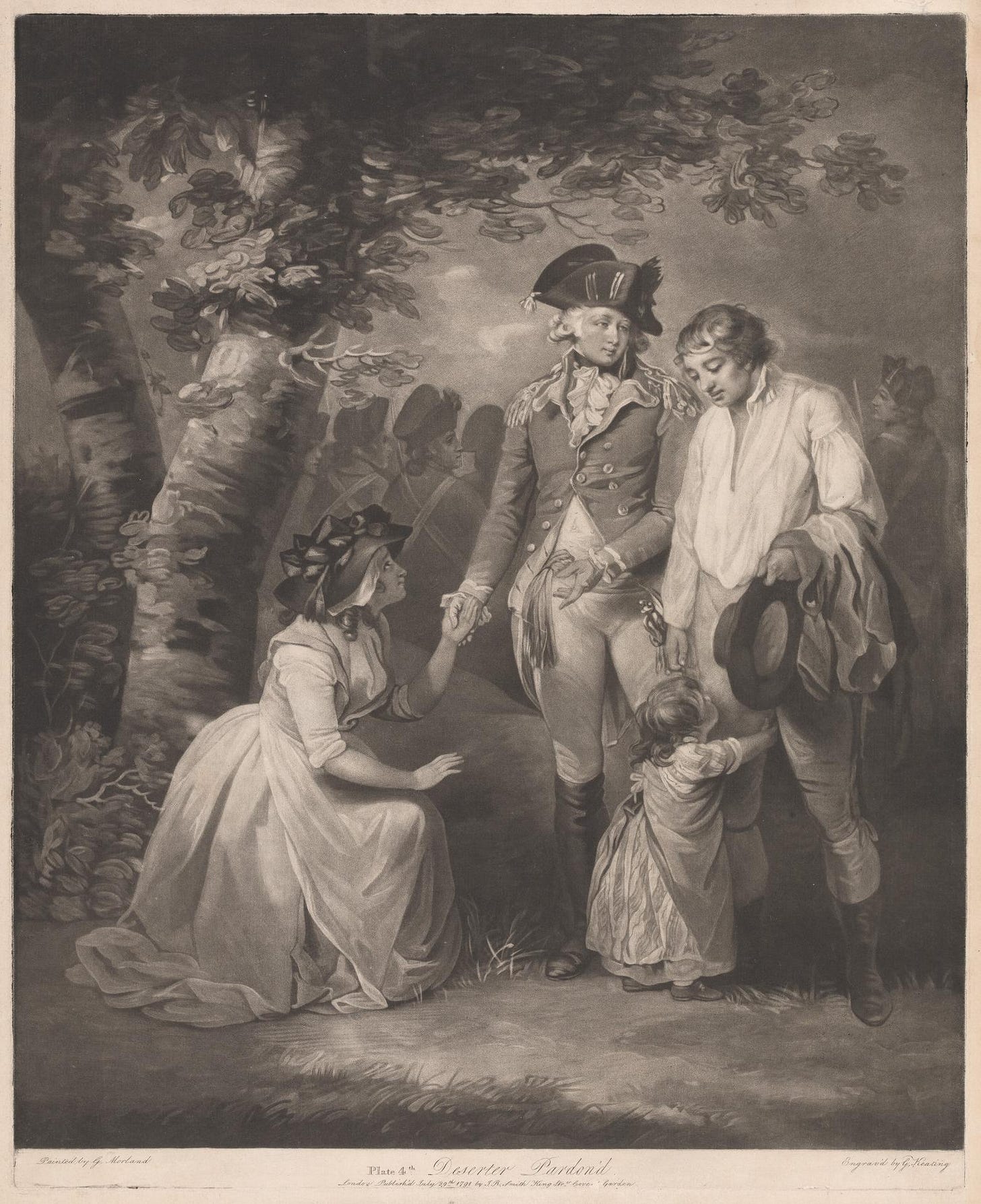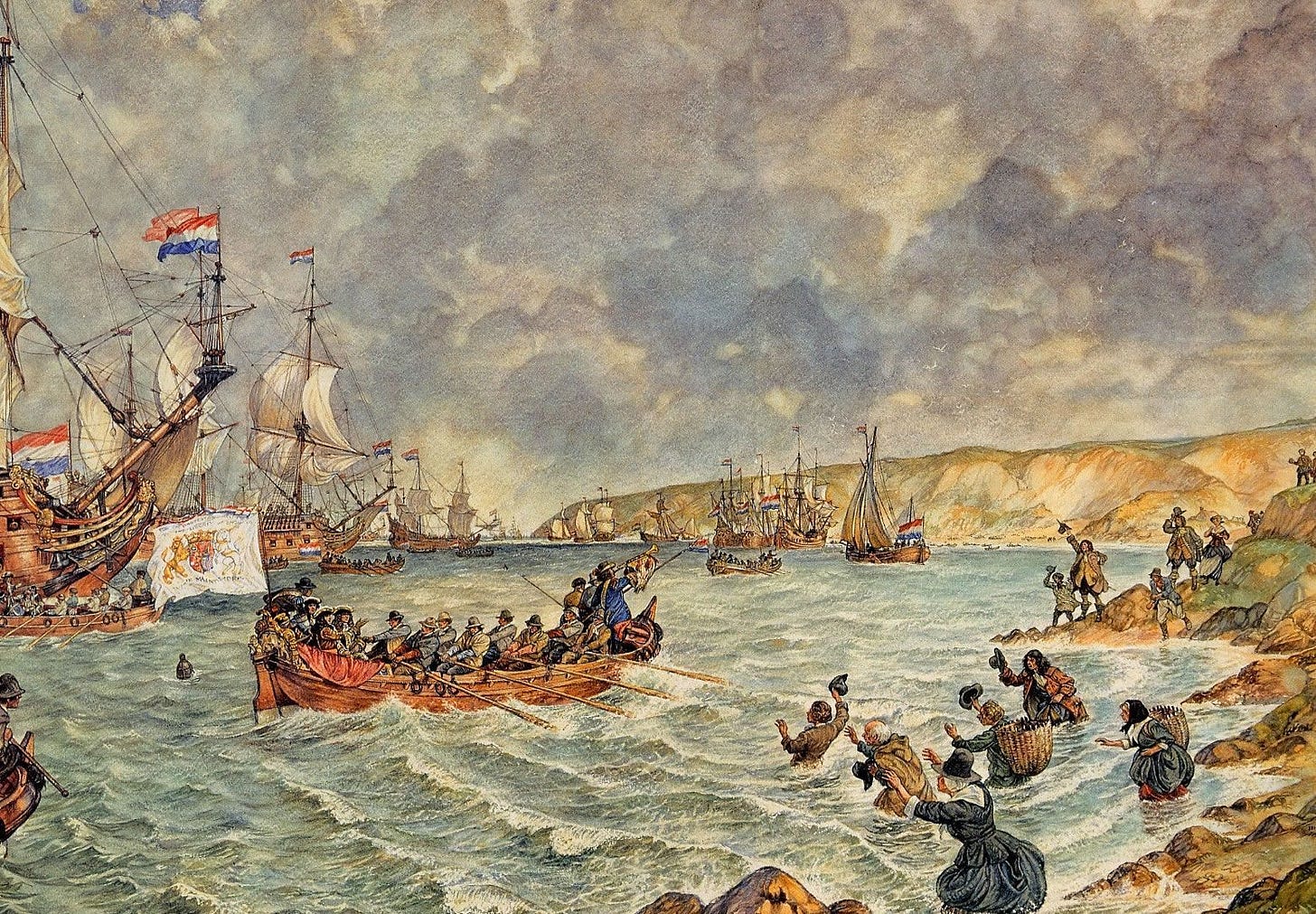
Before getting into today’s post, a special welcome to all of you who subscribed after reading my recent “Letter From London: The Ship Has Sunk.” If you enjoyed that post but did not see its sequels, you can see my subsequent Letters From London here… and here… and here!
And if you like what you’re reading, by all means share it with others, give it a “like,” restack it, or even consider supporting my work via the “buy me a coffee” link at the end of this post.
Most of the time here I am focused on books and ideas, and that will be the case today. There will be another Letter From London coming this weekend—something to look forward to if you enjoyed that mix of travel, reflection, reading, and humor. For now, though, we will think a little bit about cowardice….
Last week my students here in London read some excerpts from Thomas Hobbes’s masterpiece, Leviathan, a book I’ve taught many times over the past 25 years. Every time I read it, something different catches my eye. Leviathan is a very carefully constructed book, with each small piece of the argument cleverly designed to contribute to the whole, often in ways that are only fully clear on subsequent re-readings. Often one comes across a passage that might have initially seemed like a casual observation or throwaway remark, but which—one now realizes—Hobbes had inserted because of its role, however minor, in buttressing his larger claims.
One such sentence struck me this time. Hobbes, who famously defends governmental absolutism, is discussing the “liberty of subjects,” which more or less amounts to a freedom to act in whatever areas the sovereign has chosen not to legislate about: “The liberty of a subject lieth therefore only in those things which, in regulating their actions, the sovereign hath pretermitted.” As soon as Hobbes’s absolute sovereign chooses to legislate, that liberty is restricted accordingly.
There is, however, a very narrow range of liberty that the sovereign cannot invade, because “every subject has liberty in all those things the right whereof cannot be transferred.” In particular, Hobbes thinks that no one can ever give away the right to defend his own life. This limitation on the sovereign is of questionable value; it means, for instance, that although I recognize the sovereign’s right to kill me, “I am not bound to kill myself when he commands me.” An assurance that may be of little comfort when the king’s men come knocking on my door.
This insistence that we cannot give up the right to defend our lives causes certain problems for Hobbes, most of which we will ignore here. Except for one: it means that if I am conscripted to serve in the army, I can run away. (“There is allowance to be made for natural timorousness,” says Hobbes, “not only to women… but to men of feminine courage.”) Hobbes is humorously precise about exactly what deserters can, and what they cannot, be blamed for: “to avoid battle is not injustice, but cowardice.”
That is the sentence that caught my eye this time: not injustice, but cowardice. It is always worth paying attention to the qualities of character that Hobbes praises and blames. Pride, ambition, a confidence that I know best, an insistence on having my own way, a desire to prove my superiority by dominating others—these are all very bad. Subjects with these traits are likely to cause trouble by resisting the sovereign and refusing submission. But a bit of “natural timorousness”? For that we can make allowance. No injustice done.
In truth, Hobbes does not really mind if we are all a bit cowardly. In fact, that’s what he wants. Only if I am sufficiently afraid for my life will I submit to absolute authority as a way of escaping the “war of every man against every man” that characterizes the state of nature; only if I fear the sovereign will I submissively accept his commands. The sovereign can exercise his power more securely when his subjects are not very eager to risk life and limb. Timidity and caution produce more stability than do boldness and ambition.
To be sure, Hobbes understands that fear alone is not enough to sustain a commonwealth. His entire book is an effort to defend the legitimacy of sovereign rule, so that subjects will obey the king not simply out of fear but because they believe they ought to obey him. And the claim that we cannot give up the right to defend ourselves is problematic in other ways—if war breaks out, those excusable desertions are likely to cause trouble. It remains true, nevertheless, that for Hobbes a bit of cowardice is not really a bad thing.

Is he right? To a certain extent, he probably is. There are forms of ambition, rivalry, and contentiousness that make it difficult to sustain order or a decent common life. To pick an extreme example, think of Achilles in The Iliad. A great hero and warrior, sure. But would you want him as your next-door neighbor? Similarly, the desire to prove one’s superiority can easily slide from healthy competitiveness into a tyrannical desire to dominate others. In the face of such passions, one might well wish to see people display a bit more natural timorousness. So perhaps if Hobbes offers two cheers for cowardice, we should offer two cheers for Hobbes.
But only two. After finishing Hobbes, my students moved on to John Locke, and we read his Letter Concerning Toleration. Locke devotes most of the Letter to laying out the case for religious toleration by distinguishing between the authority of church and state, defending the rights of conscience, and sorting out the knotty cases where the domains of law and religious belief intersect. At the very end of the Letter, however, he makes a closing appeal for religious liberty that in many ways is a direct rejoinder to Hobbes about the true causes of civil unrest.
Hobbes believed that the only way to stave off sedition and rebellion was to invest the sovereign with absolute power, so that he could put down any potential threats before they ever developed. But Locke turns this argument entirely on its head. What Hobbes viewed as the solution, he says is the problem. Absolute power does not prevent rebellion; it causes it. “Just and moderate Governments are every where quiet, every where safe,” he says, in the clearest and most concise statement of his view. “But Oppression raises Ferments, and makes men struggle to cast off an uneasie and tyrannical Yoke.”
In effect, Locke takes Hobbes’s own view that people necessarily seek to defend their lives and directs it against the Hobbesian sovereign. Speaking of those subject to religious persecution, he asks, “What else can be expected, but that these men, growing weary of the Evils under which they labour, should in the end think it lawful for them to resist Force with Force, and to defend their natural Rights … as well as they can?” When cornered, people will not desert—they will fight.

This, of course, implies a somewhat different attitude toward the relative value of cowardice and courage than we saw in Hobbes. If people are as timid as Hobbes thinks, or perhaps as he wants them to be, then Locke’s claim is simply wrong. Such people will not resist force with force to defend their natural rights. Locke clearly believes that we are not quite so timid as that. Whereas Hobbes subtly seeks to encourage a bit of timorousness, Locke needs citizens who possess some bravery, because only with it can they supply a check against overweening power.
Not that Locke wants us to overdo it. In his Second Treatise of Government, where he offers a qualified defense of rebellion, Locke assures his readers that people are not likely to revolt over what Thomas Jefferson would later, in the Declaration of Independence, call “light and transient causes.” Nevertheless, if Hobbes puts his thumb on the scales in favor of cowardice, Locke does so on behalf of courage. Two cheers for courage, we might say.
Between them, Hobbes and Locke highlight certain advantages and disadvantages of cowardice and courage alike. In doing so, they invite us to think about the sources of both freedom and stability.
I am certain that their disagreement has contemporary relevance… but am not quite ready to say what it is. Sorry for the cop-out, but—being completely honest—I’m still thinking it over. I can see ways in which different sides in our current political discontents might claim to be exercising appropriate courage. And also ways in which they might call for an injection of timidity into our debates. I need a little more time to work this out. Perhaps we can return to it in a future post.
In any case, this one has gotten long enough, so even if you think me a coward for dodging the difficult question, you can nevertheless be grateful for my timorousness. As always, thanks for reading, and I’ll see you next time for another installment From My Bookshelf. Not to mention another Letter From London.
Show your support with those likes and restacks… or even help to:




Love the post Peter, find myself worried by the detachment, that is, from present pressing reality.
Hobbes & Locke. Philosophers of note, both. Trump & Putin. Deranged monstrosities both.##
Are you, Peter C. Mielaender and my good correspondent, going to be facing up with full frontal courage, you being a full on and frontal American Thinker, to the 'Derangement of Incumbent Trump' or courageous in calling out the 'Derangement of Incumbent Trump'?
Don't doubt, for as much of a smidgeon of as passing nanosecond, that I share your interest and admiration of the clear but different - as each saw it - philosophical viewpoints o f both Hobbes & Lock.
There have, not least the first, George Washington, been many deeply thoughtful and street-wise Presidents of the sovereign state you have happened to call home and feel at at home in. Springing yourself, adroitly and with alacrity, into these present passing moments what say you Peter about the raw, rough, rollicking words of White House Man? Do you concur and so support? Or do you demur and so revolt?
My best, and I assure you Peter, you have the best of this correspondents passing - though you may care to discard such - thoughts.
Rob